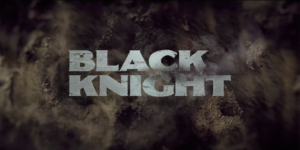
Are you looking for a dystopian action thriller today? What kind are you looking for? Would you like a desolate climate, destroyed by some cataclysmic world event within the last fifty years? Are you looking for Waterworld wet, or, more likely, Mad Max scorching desert? Yes, of course, desert is more popular. And how about the architecture? Grim, uniform and grey, à la 1984? Oh, of course, not for the rich people, just the poor. The rich will live in luxury, as per The Hunger Games. And while we’re on that, a stratified class system with the majority suffering in poor post-war conditions related to mining, we’ll just throw that in. I’m assuming you’ll want an uprising with that? Not a problem.
Combining all of these factors together, Netflix has the perfect show for you: Black Knight. It’s set fifty years in the future (check), after a comet has destroyed much of the world (check), turning the Korean peninsula into a desert (check), where clean air has become a highy sought-after commodity. Because of this, the majority of the population, divided by class (check) lives indoors, with delivery drivers bringing them the essentials they need to survive. These delivery drivers travel through the desert, fighting off marauding hunters intent on stealing these goods on their way: this makes them heroic — almost mythic — figures in this new world.
This is one of the first major projects for actor Kim Woo-bin since his treatment for cancer began in 2017, leading the cast as the legendary deliveryman ‘5-8’, against the nefarious Cheonmyeong group. Adapted from a webtoon of the same name, it isn’t hard to see what attracted Kim to the role. There’s action, social commentary and a solid good versus evil narrative. The problem is, it’s all so incredibly unoriginal that it lacks any real tension, drama, or even emotion.
As mentioned above, there are a lot of reference points bubbling just below the surface of Black Knight’s storyline. This is not uncommon for dystopian dramas: tropes such as strict class stratification and a destroyed climate are common because they reflect genuine concerns our societies have today. It’s not a problem in itself that the backdrop here is a dry, smog-clouded wasteland. It’s not a problem that the society we see is divided into classes. But how these tropes are executed without any real panache is an issue that plagues the show.
Let’s take, for example, the central premise of delivery drivers as knight-like action figures, revered for their protection and distribution of the most essential goods to the population at such a desperate time. It’s a neat idea. Moreover, it’s clearly a satirical comment on the current status of delivery drivers in Korea and beyond (the Korean name of the show literally translates to ‘courier’). These workers are everywhere in the country, even more so after the pandemic, and their hard work leads to greater convenience for the many. Transforming these figures into literal heroes is a clever way to bring attention to the situation of their real-life counterparts.
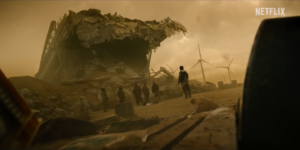
However, without any real fleshing-out of the world of the show, or development of characters’ personalities, this smart idea just results in a two-dimensional action hero. The opening monologue, delivered as sepia-toned illustrations, outlines for us why the delivery drivers are important to this air-polluted South Korea of the future. But so many details remain unclear.
The drivers work for the Cheonmyeong chaebol company, though many end up rebelling. How does this company — with control over the entire oxygen supply of the country, in a society where literally every housed person has a QR code on their hand — not have constant surveillance, and total control, of their workers? These delivery drivers all seem to be John Wick-level proficient in fighting: where exactly did they get this good, this strong? The narrative doesn’t seem interested in answering these questions at all. It wants to give us the samurai: the cowboys. But, without the stories behind them, they just end up reminding us of better characters in other apocalypses.
The same is unfortunately true for the art direction of the show. Across Netflix’s Korean output, there seems to be a ‘look’ developing in the cinematography that doesn’t serve the premise well in this case. The ‘look’ being high definition visuals, with elegant lighting, cinematically well-composed shots and sweeping vistas. It gives their productions sheen, but not necessarily much else.
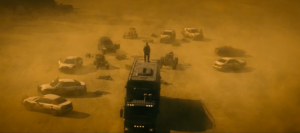
Here, we have the anticipated birds-eye views of wasteland and endless grids of housing blocks, with the upper-class backdrops in bolder colours and imposing angles. The colour grading of the lower-class world is washed out and tinged with yellow, while the offices of the chaebol are bright and neon. Again, these choices make sense to echo the world and literal atmosphere that we are in. But without further deviation from the Netflix formula, these choices end up looking like someone tried to copy Mad Max’s homework, and failed. The lighting is too flattering, the dust only seems to exist as a colour rather than a substance we see, and the camerawork tries nothing innovative.
Maybe the writing of the plotline and the characters could have saved this: as I’ve said, there’s nothing wrong with doing an idea done before, if some creativity is brought to it. But, alas, the only creativity here seems to be in constantly changing the rules of how toxic the air is (at various points masks are taken off outdoors, whilst disinfection is necessary to enter a building, and 5-8 even smokes in his delivery truck before placing his respiration mask back over his face).
The characters we meet never stray far from the stereotypical. Kim Woo-bin’s 5-8 is stoic, untalkative, amazingly strong, sharp but kind to those in need: the strong but silent gun-slinger. Yoon Sa-wol (Kang You-seok) is the plucky young refugee boy who yearns to become a heroic delivery driver: the Luke Skywalker of the show.
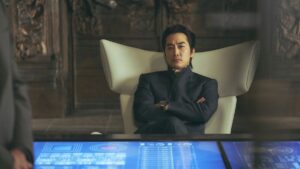
Ryu Seok (Song Seung-heon) is the son of the chairman of Cheonmyeong group, and, guess what, the man with ambitions to lead a huge conglomerate is actually not that nice, and kind of completely ruthless. The baddie, if you will. We also have our pre-requisite female character, Esom’s general Jeong Seol-ah, who we don’t have to worry about getting emotional because, of course, as a soldier she never shows emotions and takes calm command without ever getting flustered.
These characters aren’t given much to do to help break these moulds. For example, Jeong Seol-ah is given pretty much no time to express anything at all when her sister is murdered. It would have been an ideal moment for poignancy, but it is quickly skirted by with the general coolly at work investigating the case mere scenes later.
Similarly, 5-8 is revealed to have originated as a refugee (the lowest class of person in this universe) and to have survived a massacre where he attempted to resist the oppressive upper-class forces. This is shown in the briefest of flashbacks, with Kim Woo-bin unable to add any depth to this storyline through the deep stares into the distance he is given as his emotive moment.
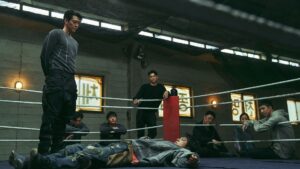
These characters are the tropes of dystopias, but are never developed into anything more. Through painfully overdone plot devices like the training montage — in an actual boxing gym — and the gunman aiming at a character’s head from out of shot, and then having a second gun pulled from behind him, Black Knight can’t seem to go anywhere new with these ideas. By the end of the six-episode run, it is fairly easy to predict how certain arcs will end, and even how certain scenes will play out. The last two episodes feel so reminiscent of The Hunger Games that you may well end up just comparing and contrasting point by point.
For all the potential irony and satire that exists in the delivery-driver-as-hero idea, Black Knight completely fails to step away from any of the clichés of the dystopian action thriller. It even had the added touch of everyone needing to wear masks all the time (imagine that), and managed to make minimal use of the parallels of this.
Whilst the cast are working as well as they can within the confines they are given — they perform the action sequences well enough — it doesn’t save this drama from being ultimately derivative, predictable, and a pale imitation of many better dystopian worlds out there. When we have so much choice over how to watch our world fall apart, we need to see something a little more experimental and creative to hold our interest.
(Youtube. Images via Netflix.)


